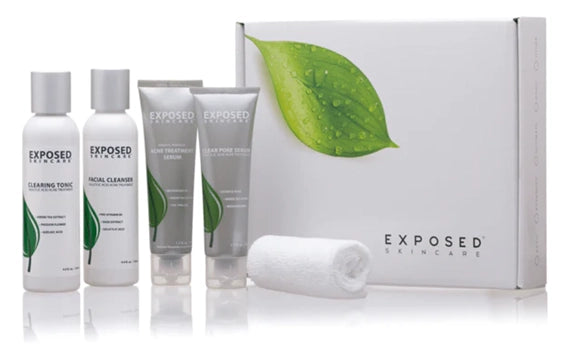Potatoes are the classic comfort food, transforming into delicious fries and hash browns. While they are a staple in the kitchen, they've also found a place in DIY skincare, with some people using them to treat acne.
But before you slice, dice, or grate a potato and slap it onto your face, there are some things you should know. This article delves into the four reasons why using potato for acne may not be the best idea.
Also read: How to choose the best acne treatment
Biggest Take-Aways:
- Using potato for acne treatment is not supported by solid scientific evidence and may not be suitable for all skin types.
- The nutrients found in potatoes, such as vitamin C and antioxidants, may not be sufficient to treat acne effectively.
- DIY potato-based remedies for acne are not only unproven but may also pose the risk of skin irritation and other issues.
- Exposed Skin Care offers a reliable, effective, and scientifically backed alternative to risky DIY methods, focusing on improving overall skin health.
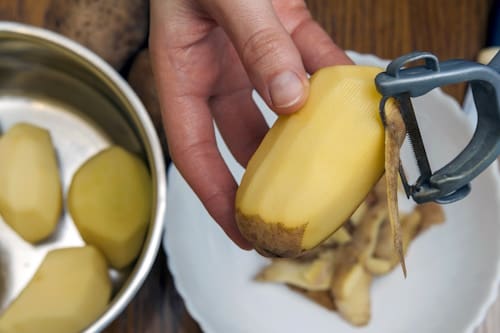
Reason 1: Potential for Skin Irritation
Many people are unaware they may be allergic to potatoes, and applying potato juice on the face can lead to uncomfortable skin irritation. Raw potatoes contain compounds known as potato glycoalkaloids.
This alkaloid can cause reactions in some individuals. The last thing you want is to exacerbate your acne or induce redness and itching when trying to soothe your skin.
Effects on Sensitive Skin
If you have sensitive skin, using a potato for acne might result in further irritation. While potatoes are rich in vitamin C and can offer some antioxidant benefits, the skin can be incredibly fickle. What works for one person may wreak havoc on another's skin.
A Patch Test Won't Always Help
While it's standard advice to conduct a patch test before applying new substances to your skin, it's worth noting that a patch test may not always accurately predict how your acne-prone facial skin will respond to potato juice.
Reason 2: Lack of Scientific Evidence
When treating acne, relying solely on home remedies that work is crucial. Despite the popular notion of using a potato for acne, there is limited scientific research to back the efficacy of this DIY method.
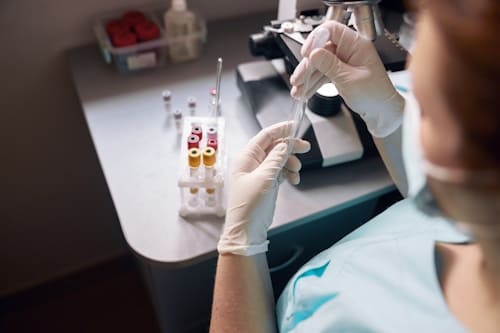
Limitations of Vitamins and Nutrients
Potatoes are rich in vitamin C and contain other vitamins and nutrients beneficial for overall health. However, when it comes to skincare, no verified studies show that the vitamins and nutrients in raw potatoes on your skin are enough to treat acne effectively.
Risks of DIY Potato Face Pack
Many DIY recipes call for making a face pack by mixing grated potato and other ingredients like lemon. While these ingredients may offer some skin benefits, the risks outweigh the benefits when using a potato for acne.
Reason 3: Other Ingredients Are More Effective
While many people resort to DIY methods to save money or use natural products, the skincare market offers a variety of acne products formulated with ingredients proven to help with acne. Substances like salicylic acid are well-studied and proven to manage acne effectively.
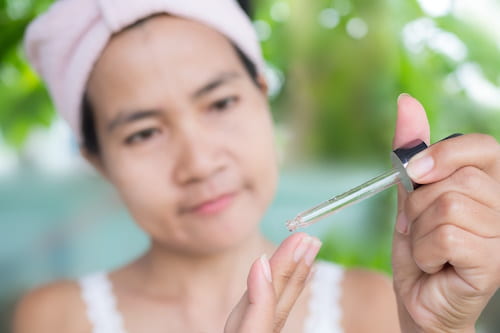
The Myth of Potato Salicylic Acid Content
Although potatoes contain small amounts of salicylic acid, the concentration is insufficient to have a notable impact on acne. Using a potato on the face won't provide the necessary levels of salicylic acid needed for effective acne treatment.
The Inefficacy of DIY Potato Juice Solutions
Various DIY potato juice solutions suggest leaving the mixture on your face for about 15 minutes before washing it off with lukewarm water. Despite these popular claims, these home remedies may not provide the desired results.
Reason 4: Risk of Developing Dark Spots
Using potato for acne can lead to unintended skin issues, such as the risk of developing dark spots and hyperpigmentation. While potatoes can help brighten skin to some extent due to their vitamin C content, there's a fine line between brightening and triggering dark spots.
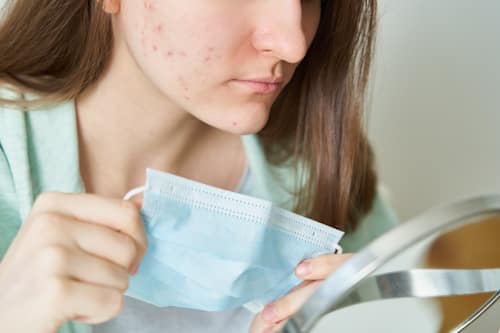
Time and Exposure Risks
Some recipes for DIY potato face packs require you to leave the mixture or slices on your skin for 10-15 minutes. The longer exposure time increases the risk of developing skin problems like dark circles under your eyes.
Can Potatoes Cause Inflammation?
Despite potatoes having some anti-inflammatory properties, there is still a risk that applying raw potatoes to your skin can cause inflammation.
This contradicts the intended purpose of reducing acne and soothing the skin, making potatoes a questionable choice for acne treatment.
Benefits of Exposed Skin Care for Managing Acne
While many are tempted to experiment with DIY treatments like putting a potato slice on the face, it's crucial to choose products formulated with both effectiveness and safety in mind. That's where Exposed Skin Care comes in.
The benefits of Exposed Skin Care are:
- Targeted Acne Treatment: Unlike the uncertainty of using potatoes to manage your pimples, Exposed Skin Care products specifically target acne, blemishes, and other skin issues.
- Rich in Active Ingredients: Forget about wondering what nutrients potato juice contains. Our products are rich in proven ingredients like salicylic acid that genuinely help the skin.
- Full Spectrum Skincare: Whether it's dead skin cells you want to slough off or reduce the appearance of blemishes, our range includes products that cleanse your skin deeply without stripping it of essential oils.
- Easy-to-Use: Say goodbye to the mess of trying to cut a potato or extract its juice. Our products are designed for easy application on the face and neck.
- Focus on Overall Skin Health: We aim not only to resolve the occasional pimple but also to contribute to your overall skin health.
Exposed Skin Care provides a holistic approach to beauty and skincare that stands head and shoulders above at-home acne remedies. It's the ideal choice for anyone looking to improve their skin without the use of questionable DIY methods.
Conclusion
The idea that you can apply potatoes to solve your acne problems isn't supported by solid scientific evidence. Instead, this approach might even exacerbate the skin issues you're trying to resolve.
Similarly, the components found in potatoes may not be enough to soothe inflammation and absorb oil effectively. Although there are claims that the nutrients in potato juice can offer anti-aging benefits, the risks of skin irritation make it an unreliable solution.
Moreover, if the goal is to ensure that a pimple resolves properly and to minimize the risk of developing further issues, relying solely on DIY methods might not be wise. Effective skincare goes beyond just washing your face; it's about targeted treatments proven to work.
For those searching for an acne solution backed by scientific research and customer satisfaction, Exposed Skin Care offers a range of products designed to treat acne and improve overall skin health. The comprehensive line-up takes the guesswork out of skincare, providing a trustworthy alternative to the uncertain realm of at-home remedies.
FAQs
Is applying potato on the face safe for all skin types?
No, potatoes may not be suitable for all skin types, and they may cause irritation or exacerbate existing conditions.
Do potatoes contain elements that can treat acne?
While potatoes contain vitamin C and antioxidants, their effectiveness in treating acne is not scientifically proven.
Can you mix potato juice with other ingredients for better results?
People often mix potato juice with ingredients like turmeric and tomato, but there's no scientific evidence to support the efficacy of these mixtures for acne treatment.
Are there better alternatives to using potato for acne?
Yes, products like Exposed Skin Care offer a scientifically-backed, comprehensive approach to treating acne and improving overall skin health.












